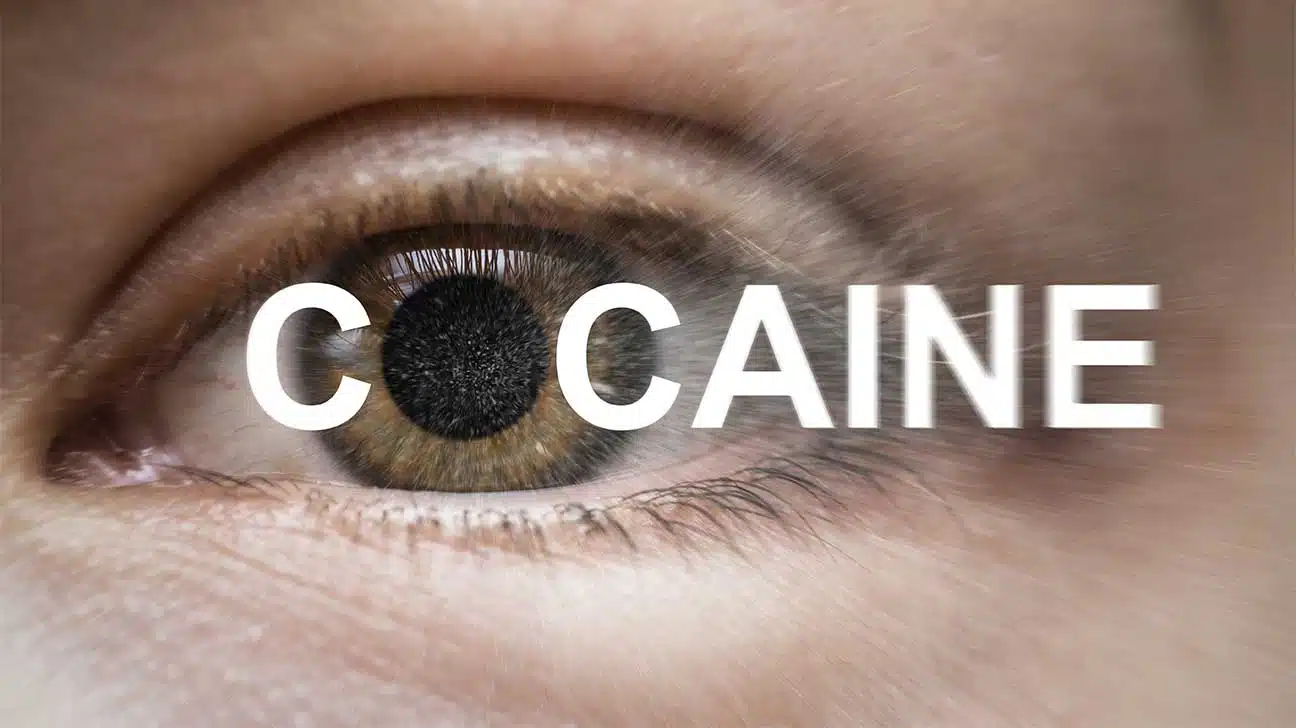
Cocaine is a highly addictive drug with a lot of potential for abuse. It’s a stimulant drug that can be taken through snorting, injecting, or smoking.
The eyes are one of the most noticeable parts of the body affected by crack cocaine use, as they are altered by both short-term and long-term substance abuse.
What Do Crack Cocaine Eyes Look Like?
Cocaine pupils, or crack cocaine eyes, typically refer to the dilated pupils that happen after ingesting the drug. The pupils expand rapidly no matter how much light is available nearby.
Chemicals in the brain like adrenaline, dopamine, and endorphins are released by cocaine use, leading to rapid pupil opening.
A common sign that a person is high from crack cocaine is wearing sunglasses in unusual situations, such as at night, due to the light sensitivity caused by pupil dilation.
Depending on how much cocaine a person does, they may also have bloodshot eyes as a result of expanding blood vessels.
People with severe crack cocaine use disorders may also have twitchy or jumpy eyes due to the drug’s effects on the central nervous system.
Effects Of Crack Cocaine On The Eyes
In addition to the short-term visual effects of cocaine, there are several long-term health complications that can arise from repeated use of the drug.
Jaundice
Long-term crack cocaine abuse can damage organs like the liver, which filters toxins out of the body.
When the liver is damaged, toxic chemicals can begin to build up in the body. This can lead to yellowing of the skin or eyes.
Jaundice is a sign of serious liver functioning issues, so it’s important to seek healthcare right away if these symptoms appear.
Glaucoma
Glaucoma is a common eye condition in older people and is caused by buildups of fluid pressure that can obscure vision. It is one of the top causes of blindness in the country.
People who abuse cocaine are about 45% more likely to eventually develop glaucoma than people who don’t use stimulant drugs.
Keratitis
People who smoke crack cocaine are at an increased risk of keratitis, which can be caused by vapors irritating and numbing the eye.
Repeated irritation can constrict blood flow in the eyes, causing blurred vision, corneal ulcers, and damage to the optic nerve.
Chronic dry eyes also make the cornea, or the surface of the eye, more likely to become scratched, irritated, or scarred by dust and other foreign particles.
Endophthalmitis
Endophthalmitis is an infection in the inner eye. In people who use crack cocaine, it’s typically caused by sharing or using dirty needles to inject drugs.
If left untreated, this condition can lead to partial or full vision loss as well as infection complications elsewhere in the body.
Nystagmus
Also known as rapid eye motion, nystagmus refers to involuntary eye movement or twitching of the eye muscles.
Nystagmus is a permanent condition caused by the deterioration of the muscles and optic nerves in the eyes. It can affect one or both eyes and may lead to side-to-side or circular motions.
Signs Of Crack Cocaine Addiction
If you are concerned that you or a loved one may be experiencing crack cocaine addiction, there are a few key symptoms you can watch out for.
Some signs of cocaine use include:
- recurring nosebleeds or runny nose
- dilated pupils
- nausea
- insomnia
- restlessness
- sudden weight loss
- elevated heart rate
- raised body temperature
- anxiety or depression
- high blood pressure
There are also behavioral signs, such as sudden financial difficulties or withdrawing from loved ones to consume drugs.
Long-term cocaine use can lead to serious physical side effects like heart attacks or strokes in addition to mental health issues such as hallucinations, psychosis, or panic attacks.
If you or your loved one have experienced five or more of the above symptoms, you may have a cocaine addiction and should seek care at a treatment center as soon as possible.
Get Help For A Substance Use Disorder Today
If you or a loved one are battling drug addiction or alcohol abuse, you are not alone. Reach out to us today to learn more about your addiction treatment options.
Published on December 19, 2023
Addiction Resource aims to provide only the most current, accurate information in regards to addiction and addiction treatment, which means we only reference the most credible sources available.
These include peer-reviewed journals, government entities and academic institutions, and leaders in addiction healthcare and advocacy. Learn more about how we safeguard our content by viewing our editorial policy.
- National Institute on Drug Abuse – What are the long-term effects of cocaine abuse?
https://nida.nih.gov/publications/research-reports/cocaine/what-are-long-term-effects-cocaine-use - National Library of Medicine – Crack eye syndrome
https://pubmed.ncbi.nlm.nih.gov/10457695/ - National Library of Medicine – Smoke Gets in the Eye: A systematic review of case reports of ocular complications of crack cocaine use
https://pubmed.ncbi.nlm.nih.gov/34337815/
